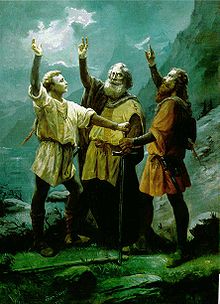Rütli Oath
[1] The account in the White Book of Sarnen mentions how Beringer von Landenberg, the reeve of Unterwalden, ordered the confiscation of oxen from the farmer at Melchi (Sachseln).This account is followed by the story of William Tell and the Burgenbruch, followed by the Rütli Oath itself, taken by Walter Fürst of Uri, Werner Stauffacher of Schwyz and Arnold von Melchtal of Unterwalden.Tschudi retains the names of the three oath-takers (Eidgenossen) already mentioned in the White Book of Sarnen (1470), Werner Stauffacher for Schwyz, Walter Fürst for Uri and Arnold of Melchtal for Unterwalden.The traditional date of 1307 for the first "conspiracy" between the three founding cantons is made plausible by the suggestion due to Roger Sablonier (2008) that the Federal Charter of "1291" may have been slightly pre-dated, and should be placed in the context of the inheritance of territories in Schwyz by Wernher von Homberg in 1309.The most famous version of the oath is no doubt that found in the play: Wir wollen sein ein einzig Volk von Brüdern, in keiner Not uns trennen und Gefahr.Wir wollen frei sein, wie die Väter waren, eher den Tod, als in der Knechtschaft leben.[dubious – discuss] The building of Switzerland as a federal state in the first half of the 19th century (1803–1848) revived symbols of the period of growth of the Old Swiss Confederacy in the Late Middle Ages, including the legends of William Tell and Arnold Winkelried and the Rütli oath.



Henry FuseliJames VibertfoundationOld Swiss ConfederacycantonsSchwyzUnterwaldenRütliLake UriSeelisbergSwiss historiographyWilliam TellFriedrich SchillerHistoriography of SwitzerlandWhite Book of SarnenSachselnAltzellenWerner StauffacherGertrud StauffacherBurgenbruchTellenliedWilhelm TellJacob StampferChronicon HelveticumAegidius TschudiEidgenossenWalter FürstArnold of MelchtalThree TellsSwiss peasant war of 1653Foundation of the Old Swiss ConfederacyFederal Charterpact of BrunnenRoger SablonierWernher von Homberggrowth of the Old Swiss ConfederacyLucerneZürich guild revolutioncommunal movement in medieval EuropeGolden Bull of 1356Battle of SempachAltdorfKonrad BaumgartenSwiss national holidaySwiss identitySwitzerland as a federal stateArnold WinkelriedSempacherliedSwiss Federal Chartertimes of warSchwurhandRanke, KurtHistorical Dictionary of SwitzerlandAlbrecht GesslerStauffacherinUrner TellspielChronicle of the Swiss ConfederationGuillaume TellWilliam Tell OvertureAdventures of William TellThe Story of William TellThe Adventures of William TellCrossbowThe Legend of William TellShooting an apple off one's child's headSwitzerlandarticlesHistoryTimelineEnlargementEarly historyRoman eraOld ConfederacyGrowthReformationEarly Modern eraNapoleonic eraRestorationFederal stateWorld warsModern historyMilitary historylist of warsHistoriographyGeographySwiss AlpsSwiss PlateauJura MountainsSubdivisionsCentral SwitzerlandEastern SwitzerlandRomandyDistrictsMunicipalitieslist of cities and townsStatistical regionsClimateEarthquakesExtreme pointsForestsGlaciersHydrologyIslandsMountain passesMountainsRiversPoliticsAdministrative divisionsConstitutionCourtsSupreme CourtElectionsForeign relationsFederal CouncilPresident of the ConfederationFederal administrationHuman rightsLandsgemeindeLaw enforcementMilitaryNational RedoubtNeutralityParliamentNational CouncilCouncil of StatesPolitical parties